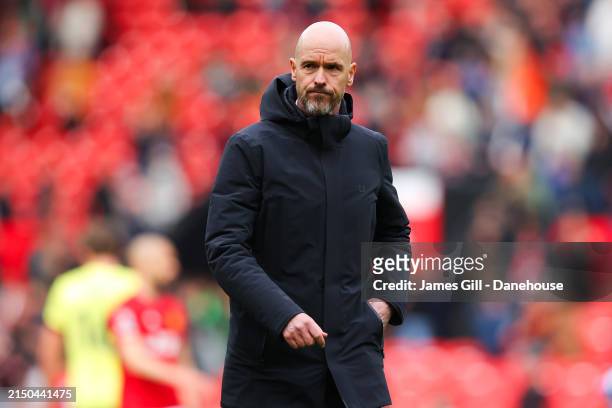Erik ten Hag was perhaps stretching things a little saying that his Manchester United were "One of the most dynamic and entertaining teams in the league at this moment" in the wake of a 1-1 draw with Vincent Kompany's relegation-threatened Burnley last weekend.
Whilst things are probably not as bad as plenty of media critics have been keen to suggest, the Dutchman's comments came off as somewhat desperate, the signs of an under pressure manager knowing he's on borrowed time.
But should he be? Let's take a look at his turbulent, chaotic second season, and analyse the circumstances has had to operate in.
RECRUITMENT
It is absolutely no secret that Ten Hag wanted Barcelona midfielder and fellow Dutchman Frenkie De Jong in his first summer in charge, having brought him into the first team in their time together at Ajax. However, United's recruitment department has been reputed for its inefficiency in recent times, a lack of a plan B forcing the club to panic buy a completely different kind of midfielder in Real Madrid's Casemiro.
After a positive first season, the Brazilian has experienced a sharp decline this campaign, looking very much like a 32 year old player losing his legs a little more every game. An outlay of £70m for a player who Real Madrid saw as expendable is a glaring example of the failure to plan ahead that we have seen time and time again from the recruitment department at the club.
It is amid this backdrop that Ten Hag has started to attempt to rebuild Manchester United, hindered by an inefficient buying (and selling) process that puts him up against it compared to his counterparts at clubs like Liverpool, Manchester City and Arsenal.
But all is not lost. The arrival of INEOS owner Sir Jim Ratcliffe as the new part owner of the club and the new chief of the club's footballing department has expedited a much-needed revamp, with experienced figures such as former Manchester City Chief Operations Officer Omar Berrada and technical director Jason Wilcox will provide the manager with much needed know-how and backing in future windows, ensuring that the responsibility for recruitment no longer lies solely at the manager's feet and allowing Ten Hag to concentrate on matters on the field.
INJURIES
Any team that has had over 60 injuries in one season and been forced to play with over 30 different defensive combinations is always going to struggle, particularly given just how many of those injuries have indeed been concentrated in the back line, something that Ten Hag was keen to stress in an interview with Gary Neville this week.
In fact, the situation has been such that the manager has only been able to field his first choice back four (Dalot-Varane-Martinez-Shaw) twice all season, which would present a challenge for any manager in world football. We only have to observe Jurgen Klopp's Liverpool without star defender Virgil van Dijk back in the 2020/2021 to understand just how debilitating injuries to key players can be.
Ten Hag isn't blameless, but he deserves another season
Let's get it straight, the Dutchman isn't faultless. Some seriously questionable selection decisions and in-game substitutions have not helped his cause this season, surrendering control of games after taking off key players ( Kobbie Mainoo is a repeated example that serves to underline the lack of depth at the club). Nevertheless, under the circumstances at hand and especially with the credit in the back from a remarkable first season in which the team won a trophy and qualified for the Champions League, the section of the United fanbase calling for Ten Hag to be fired should show some patience.
Based on the previous ten years, changing managers won't solve the problem, perhaps it's time to let one build a project.


